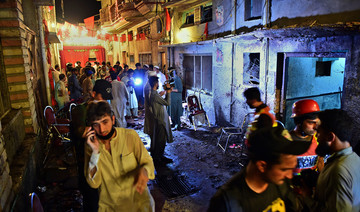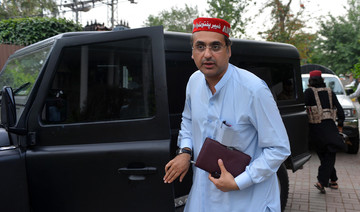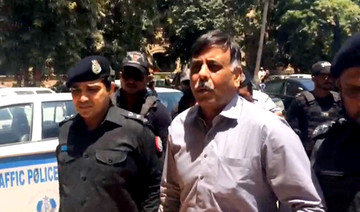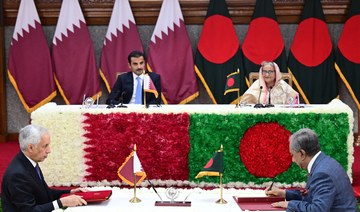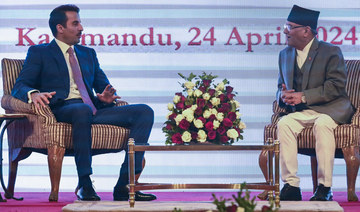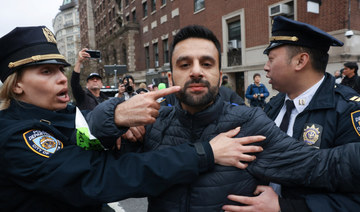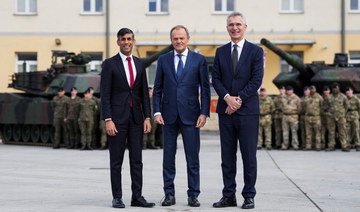PESHAWAR: Thousands flocked to the funeral Wednesday of a politician killed by a Taliban suicide bomber in northwestern Pakistan's Peshawar, hours after the explosion left 20 dead in the first major attack ahead of July 25 polls.
A senior police official estimated that 30,000 people attended the funeral of the local leader of the Awami National Party (ANP), Haroon Bilour, was among those killed in the attack late Tuesday during an election rally.
Party workers cried and hugged, while others looked on in shock as funeral prayers were said.
Markets were also closed across the bustling frontier hub near the Afghan border out of respect for those killed in the attack.
The ANP has been targeted by Islamist militants in the past over its vocal opposition to extremist groups like the Taliban.
The bombing came hours after Pakistan's military spokesman said there were security threats ahead of the national elections.
Bomb disposal chief Shafqat Malik told AFP that the suicide bomber -- who he said was around 16 years old -- had eight kilograms (18 pounds) of explosives and three kilograms of pellets, ball bearings and other shrapnel on his body.
Peshawar lawyers went on strike on Wednesday to protest and mourn the death of Haroon, who was also a barrister.
Bilour was one of the ANP's election candidates and belonged to an influential political family in the Khyber-Pakhtunkhwa province, of which Peshawar is the capital.
His father Bashir Bilour, one of the ANP's top leaders, was also killed by a suicide bomber in 2012.
Police said the bomber struck when Bilour was about to address some 200 supporters.
Mohammad Khorasani, spokesman for the Tehreek-e-Taliban Pakistan (TTP) militant group, claimed responsibility for the attack in a statement.
He said the militants "have already declared a war" on the ANP and called on the public to keep away from them, "or you will be responsible for your own loss".
Peshawar is considered a gateway to Pakistan's troubled semi-autonomous tribal regions, where many militant groups -- including Al-Qaeda -- operated until the government launched operations to oust them.
The attack comes weeks after the TTP's leader Maulana Fazlullah was killed in a drone strike in Afghanistan in what the Pakistani army called a "positive development".
Militants have targeted politicians, religious gatherings, security forces and even schools in Peshawar.
But security across Pakistan, including in Peshawar, has dramatically improved since government and military operations in recent years.
Analysts warn however that Pakistan has yet to tackle the root causes of extremism.
Thousands attend funeral of Pakistan politician killed by Taliban
Thousands attend funeral of Pakistan politician killed by Taliban
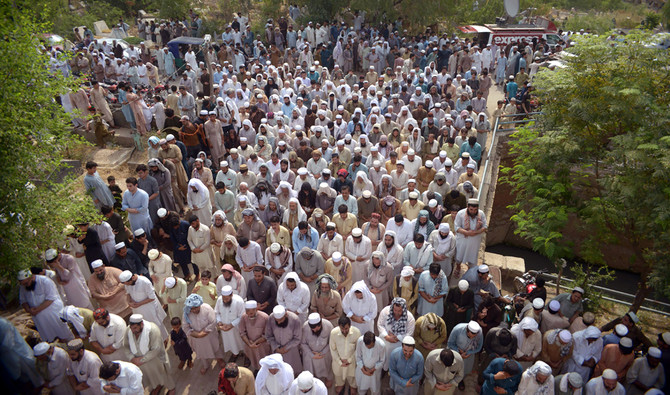
- Militants have targeted politicians, religious gatherings, security forces and even schools in Peshawar
- Police said the bomber struck when Bilour was about to address some 200 supporters
Germany charges six suspected Daesh-K members over attack plots
They intended to carry out high-profile attacks in Germany and Western Europe
BERLIN: Germany has charged six foreign nationals for allegedly plotting terrorist attacks on behalf of the Daesh Province of Khorasan (Daesh-K), the federal prosecutor’s office said on Wednesday.
The suspects, identified as Tajik citizens Mukhammadshujo A., Nuriddin K., Shamshud N., Said S., Raboni Z., and Kyrgyz citizen Abrorjon K., are charged with founding a terrorist organization, among other things.
They intended to carry out high-profile attacks in Germany and Western Europe but had no concrete plan when law enforcement intervened, according to the statement.
The suspects, who were arrested in July last year, had been in touch with Daesh-K, the Afghan offshoot of Daesh, which claimed responsibility for a mass shooting in Moscow last month in which at least 137 people were killed.
According to investigators, the suspects arrived in Germany via Ukraine after war broke out there in spring 2022, and formed a terrorist cell together with another member from the Netherlands.
They met regularly to discuss their intentions and scouted potential locations in Germany, the prosecutors’ statement said.
UK police arrest three over migrants’ deaths in Channel
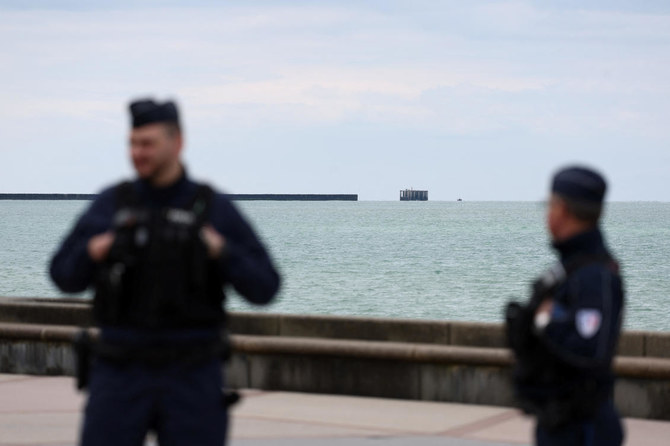
- The men, two Sudanese nationals aged 22 and 19, and a South Sudan national aged 22, were detained
- Suspects were arrested on suspicion of facilitating illegal immigration and entering the UK illegally
LONDON: British police said on Wednesday they had arrested three men over the deaths of five migrants including a child who drowned attempting to cross the Channel from France the day before.
The men, two Sudanese nationals aged 22 and 19, and a South Sudan national aged 22, were detained on Tuesday night, the National Crime Agency (NCA) said.
They were arrested on suspicion of facilitating illegal immigration and entering the UK illegally.
“This tragic incident once again demonstrates the threat to life posed by these crossings and bring into focus why it is so important to target the criminal gangs involved in organizing them,” said NCA Deputy Director of investigations Craig Turner.
New agreement to safeguard rights of Bangladeshi workers in Qatar
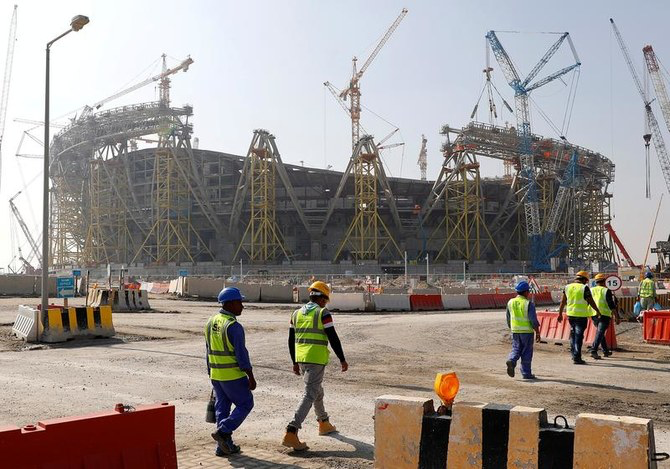
- 350,000 Bangladeshis are employed in Qatar, mostly in construction sector
- MoU signed during Sheikh Tamim bin Hamad Al-Thani’s visit to Dhaka this week
Dhaka: A new agreement between Qatar and Bangladesh includes commitments to establish protections for migrant workers, a top official said on Wednesday, as the Gulf state has been under harsh criticism over failing to safeguard the rights of laborers who constructed its 2022 FIFA World Cup infrastructure.
Migrant workers from South Asia, especially Bangladesh and Nepal, were indispensable to Qatar as it prepared to host the world’s biggest football event, and have been an important part of its economy. Some 350,000 Bangladeshis are employed by Qatar’s government, semi-government and private sector.
The jobs have enabled them to send remittances back home to their families, but many have reported contract violations and illnesses linked to unsafe working conditions. The problems entered the spotlight between 2010, when FIFA granted Qatar the World Cup, and 2022, when the event took place.
During the decade, seven new stadiums, an airport expansion, a new metro and hotels were constructed by 30,000 foreign laborers, according to the Qatari government. Rights groups and investigative journalists have estimated that more than 6,000 of them died in work-related deaths.
A new memorandum on Bangladeshi migrant workers — 80 percent of whom are employed in Qatar’s construction industry — was signed this week as Qatar’s emir, Sheikh Tamim bin Hamad Al-Thani, visited Dhaka.
“A joint working group will be formed for solving labor rights issues,” Khairul Alam, additional secretary at Bangladesh’s Ministry of Expatriates Welfare and Overseas Employment, told Arab News.
“Our Ministry of Expatriates Welfare and Overseas Employment will lead the joint working group from the Bangladeshi side.”
The agreement commits the Qatari and Bangladeshi sides to discuss “ways to develop legislation relevant to areas of labor” and includes plans for a review to ensure that worker rights are in place.
“Labor rights protection, safety and healthy environment issues have also been emphasized in the MoU, and mentioned several times,” Alam said.
“The agreement also said that in case of any issues regarding migrants both countries will sit together and solve the issues amicably.”
The signing of the agreement was welcomed by the Migration Program and Youth Initiatives of BRAC — Bangladesh’s largest development organization, which estimated that more than 1,300 workers from the country died in Qatar during the World Cup construction spree, with many deaths attributed to heart attacks.
“Most of our migrant workers prefer the Middle Eastern countries, and after Saudi Arabia, UAE and Oman, Qatar is the preferred destination for the Bangladeshi migrants. In this context, such a type of MoU on labor employment is helpful for the protection of migrant workers’ rights,” said Shariful Hasan, the program’s associate director.
Hasan told Arab News it was an “expression of interest from both sides to ensure the welfare of the migrants,” who were playing a significant role in Qatar’s development.
“If the migrant-receiving country like Qatar focuses on the welfare and protection of the migrants, it will create a win-win situation for both countries. I think the signing of this MoU is a big development toward this.”
Columbia University cites progress with Gaza war protesters following encampment arrests

- Student protesters “have committed to dismantling and removing a significant number of tents,” the university said
- A smaller encampment remained on campus Wednesday morning
NEW YORK: Columbia University said early Wednesday that it was making “important progress” with pro-Palestinian student protesters who set up a tent encampment and that it was extending a deadline to clear out, yet standoffs remained tense on the Ivy League campus in upper Manhattan.
Student protesters “have committed to dismantling and removing a significant number of tents,” the university said in a statement. A smaller encampment remained on campus Wednesday morning.
Across the country, protesters at California State Polytechnic University, Humboldt, some 300 miles (480 kilometers) north of San Francisco, started using furniture, tents, chains and zip ties to block the building’s entrances Monday evening.
Both campuses are part of intensifying demonstrations over Israel’s war with Hamas by university students demanding that schools cut financial ties to Israel and divest from companies that are enabling its monthslong conflict. Dozens have been arrested on charges of trespassing or disorderly conduct.
Columbia President Minouche Shafik in a statement Tuesday set a midnight deadline to reach an agreement with students to clear the encampment, or “we will have to consider alternative options.”
By around 3 a.m., the university said that there was “constructive dialogue” and that it will continue conversations for 48 hours.
The statement said student protesters “will ensure that those not affiliated with Columbia will leave. Only Columbia University students will be participating in the protest.”
Student protesters also will comply with city fire department requirements and “have taken steps to make the encampment welcome to all and have prohibited discriminatory or harassing language,” the statement said.
The university’s statement was released hours before US House Speaker Mike Johnson’s trip to Columbia to visit with Jewish students and address antisemitism on college campuses.
Earlier Tuesday night, police arrested more than 200 protesters blocking traffic during a non-college demonstration demanding a permanent ceasefire in Gaza at Grand Army Plaza in Brooklyn, near the home of Sen. Chuck Schumer. The protest was organized by Jewish Voice for Peace on the second night of Passover, and protesters lay down a large circular banner depicting the food on a Seder plate.
At Cal Poly Humboldt, protesters chanted, “We are not afraid of you!” before officers in riot gear pushed into them at the building’s entrance, video shows. Student Peyton McKinzie said she was walking on campus Monday when she saw police grabbing one woman by the hair, and another student having their head bandaged for an injury.
“I think a lot of students are in shock about it,” she said.
Three students have been arrested, according to a statement from the school, which down the campus until Wednesday. Students had occupied a second campus building Tuesday.
Another encampment was set up Tuesday at the University of Rochester in upstate New York. Omar Darwesh, a Palestinian senior, said he has lost relatives to the war.
“We’re not calling for the destruction of Israel, we’re never talking about threatening Jews — the focus is on us and what we need, and that’s being treated like a human. We have to find a way to coexist,” he told TV station WHEC.
University of Rochester officials said in a statement that the protesters must follow ground rules, including presenting university identification if asked.
The upwelling of demonstrations has left universities struggling to balance campus safety with free speech rights. Many long tolerated the protests, which largely demanded that schools condemn Israel’s assault on Gaza and divest from companies that sell weapons to Israel.
Now, universities are doling out more heavy-handed discipline, citing safety concerns as some Jewish students say criticism of Israel has veered into antisemitism.
Protests had been bubbling for months but kicked into a higher gear after more than 100 pro-Palestinian demonstrators who had camped out at Columbia were arrested Thursday.
By late Monday at New York University, police said 133 protesters were taken into custody and all had been released with summonses to appear in court on disorderly conduct charges.
In Connecticut, police arrested 60 protesters, including 47 students, at Yale after they refused to leave an encampment on a plaza at the center of campus.
Yale President Peter Salovey said protesters had declined an offer to end the demonstration and meet with trustees. After several warnings, school officials determined “the situation was no longer safe,” so police cleared the encampment and made arrests.
A demonstration Tuesday at the University of Michigan grew to nearly 40 tents, and nine war protesters at the University of Minnesota were arrested after police took down an encampment in front of the library. Hundreds rallied in the afternoon to demand their release.
Harvard University in Massachusetts has tried to stay a step ahead of protests by locking most gates into its famous Harvard Yard and limiting access to those with school identification. The school has also posted signs that warn against setting up tents or tables on campus without permission.
Literature doctoral student Christian Deleon said he understood why the Harvard administration may be trying to avoid protests but said there still has to be a place for students to express what they think.
“We should all be able to use these kinds of spaces to protest, to make our voices heard,” he said.
Ben Wizner, a lawyer with the American Civil Liberties Union, said college leaders face extremely tough decisions because they have a responsibility to ensure people can express their views, even when others find them offensive, while protecting students from threats and intimidation.
The New York Civil Liberties Union cautioned universities against being too quick to call in law enforcement in a statement Tuesday.
“Officials should not conflate criticism of Israel with antisemitism or use hate incidents as a pretext to silence political views they oppose,” said Donna Lieberman, the group’s executive director.
Four injured as escaped army horses bolt through central London
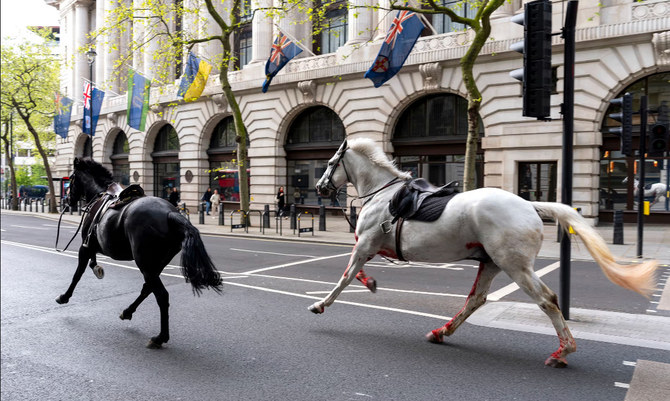
- Two horses ran along busy roads, dodging buses, taxis and other traffic
- Both were wearing saddles and bridles, with one apparently covered in blood on its chest and forelegs
LONDON: Four people were taken to hospital after spooked army horses broke loose during morning exercises in central London and galloped through the streets at rush hour, the army and emergency services said.
Photos and video posted on social media by British news outlets showed two horses running along busy roads, dodging buses, taxis and other traffic.
Both were wearing saddles and bridles, with one apparently covered in blood on its chest and forelegs.
A number of prestigious army cavalry regiments have stables in the British capital and horses are a regular sight around government buildings on Whitehall, Buckingham Palace, The Mall and in nearby Hyde Park.
London Ambulance Service said it was called at 8:25 am (0725 GMT) to reports of a person being thrown from a horse on Buckingham Palace Road.
No details were released on the injured people or the exact circumstances of their injuries.
The driver of a Mercedes car told LBC radio he had been waiting outside a hotel in Buckingham Palace Road when he felt something smash into his car.
He said he saw three or four horses near the vehicle, and that an army rider had been thrown off and injured.
One horse also reportedly crashed into a parked double-decker tour bus, smashing the windscreen.
One commuter shared a video on social media platform X, formerly Twitter, showing a black horse and a white horse being pursued by a black car.
“It was the street from Tower Bridge toward Limehouse Tunnel... just running past cars and an unmarked Range Rover following them,” the person said.
Up to seven horses initially got loose, Britain’s domestic Press Association news agency reported, with police working with the army to recapture them.
The army said in a statement that “a number of military working horses became loose during routine exercise this morning.”
“All of the horses have now been recovered and returned to camp. A number of personnel and horses have been injured and are receiving the appropriate medical attention,” it added.
Two of the horses were recaptured by the City of London Police, which polices the Square Mile financial district.
It said officers had contained two animals and that “an army horse box had collected the horses and transported them to veterinary care.”


